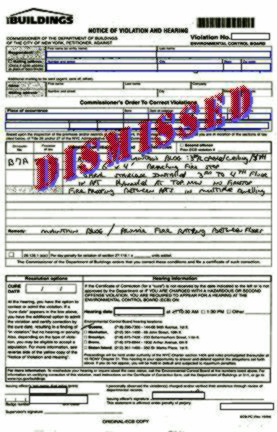Latest Update: OATH is holding remote hearings, trials, conferences, and Help Center sessions. In-person appearances are also available upon request.
All hearings must be requested and prescheduled before the scheduled hearing date. You can request a Hearing by Phone or a Hearing in Person.
Hearing in Person: You can request an in-person hearing. The request must be emailed to livehearings@oath.nyc.gov at least five (5) business days before the hearing date. You will then receive an email with date, time and location information for your hearing. Please note that enforcement agencies that send representatives to hearings will continue to appear by phone for all hearings. No enforcement agency personnel will be present at in-person hearings.
The Environmental Control Board (ECB) is an administrative tribunal which is a division of the Office of Administrative Trials and Hearings (OATH) that adjudicates notices of violation issued for various infractions of the City’s laws and rules that are issued by the; Department of Buildings’, Fire Department, Department of Sanitation, Department of Transportation, DEP – Bureau of Air Resources, Dept. of Parks & Recreation, NYPD Traffic & Highway amongst others.
As a judicial entity, ECB does not issue notices of violation, does not establish enforcement policies, does not employ inspectors or agents, and does not direct, control or otherwise influence where, when or to whom notices are to be issued. The ECB was established for the purpose of relieving the criminal justice system from the burden of enforcing the violations issued by various City agencies and instead created the ECB jurisdiction. Just so that you understand, there is a big difference between the two courts in that the ECB may find you guilty by the preponderance of evidence (which is just over 50%) and the criminal justice system will use the “innocent until proven guilty” process.
Once a notice of violation is issued, the matter may only be resolved through the adjudication process at the Board. An exception to this would be a procedure called “written in error”, where the issuing agency will request the Board dismiss the violation and it does not wish to further prosecute the alleged violation.
Generally, only persons or entities that have been named in the violation/s (respondents) are entitled to a hearing and may only have a hearing within the legal time limits (see appeals decision #40547). Respondents may also be represented by legal counsel or by any authorized agent such as M. Ben Reich who can present the defense to the charges made by the City agency.

Received A Notice Of Violation?
A notice of violation must be answered in one of five (5) ways:
- Pay the mail-in penalty amount indicated on the notice of violation, if applicable.
- Appear in person, authorized representative, registered representative (who does not have to be an attorney) to present a defense before a Hearing examiner at an OATH/ECB location.
- Mail a written statement, sworn to before a notary public that details your defense to the charges contained in the notice of violation.
- Online one-click hearing or Webcam online hearing: If you want to have a One-Click Hearing and your case is eligible, you can use the One-Click Hearing E-Form and enter all the information which is required. You may write up to ten pages explaining why you think the ticket should be dismissed and you may attach up to three files of supporting documentation with a maximum total size of 3MB.
- Hearing-by-Phone/Video: You can call OATH Hearings Division’s Remote Hearings Unit at 212-436-0777 to schedule your phone/video Hearing. You must call to schedule your phone/video hearing before the hearing date on the summons. If you are interested in learning whether you can schedule an ECB Hearing-by-Phone, you can call (212) 436-0777.
Due to the COVID-19 outbreak, OATH offices are currently closed and OATH is not conducting hearings in-person. OATH has transitioned to providing the option of a telephonic hearing for all cases. Visit OATH for more details.
ECB has three full-time and two part-time hearing offices. Each notice of violation has a hearing date indicated on the notice of violation. You must respond to the charges on or before that date. If you choose to appear in person, your hearing may take several minutes or several hours, depending on the charges made by the City enforcement agency.
Decision and Order:
At the hearing you may submit motions and raise arguments in your defense. You may submit testimony and evidence to support your motion and argument. The Judge will decide whether to grant or deny your motion and argument.
In the event the Judge grants your motion and/or argument, the violation will be dismissed, no penalty will be imposed and will not require filing correction with the agency who issued the violation.
If the violation is sustained, a penalty may be imposed which is also an order to comply and file such correction with the issuing agency. The Judge does not have discretion with regards to the amount of the penalty. The penalty imposed is based on a penalty schedule which is approved by the Board.
Default:
If you do not respond to the notice of violation in any of the ways described above, you will be in default and maximum penalties will be imposed. If you fail to answer the notice of violation in one of the five ways described by the hearing date indicated on the notice of violation you may be subject significantly higher default penalties. However, you can download and submit a stay of default application on the form provided by the ECB or submit it online. If your request is submitted within 60 days from the default date, you will be granted a new hearing date and an opportunity to defend the allegation/s. After the 60 day period you will need to submit additional supporting documents together with your request in support of the reason for your default. If the request was granted but ECB failed to notify you about the new hearing date at the address you indicated on the application, download and submit this application to verify mailings.
Appeals (after the hearing):
If you do not agree with the decision of the administrative law judge, you may submit a written appeal application to the Environmental Control Board’s Appeals Unit within 30 days after receiving the decision, provided that payment is made within 30 days from the mailing date of such decision. You may also choose to submit your appeal online. Your statement should include a clear explanation of why you think the Board should review your case and why you believe the Judge erred in the decision. On appeal you can only raise issues you disagree with based on fact-findings and/or conclusions of law. New arguments and/or new evidence that weren’t raised and submitted at the initial hearing will not be entertained on appeal.
The appeals Board will generally not alter any decision that is solely based on credibility and defer such decision to the hearing officer. The Board may sustain, modify, reverse the Hearing officer’s decision or remand the case to a new hearing. The decision of the Board is final and can only be appealed by filing an Article 78 proceeding at the State Supreme Court.
Although the decision may be reversed on appeal in your favor, ECB will not refund the payment before they conduct a search of their database to check if you owe monies for any outstanding unpaid violations. Furthermore, even if there is a newly issued violation and a judgment was not entered yet, they still will not release the refund.
Extension:
To request an extension of time to file the appeal you must submit your written extension request or online extension application before the time frame to file the appeal.
Financial Hardship:
You may post a bond in lieu of payment for an annual premium of 2% of the amount of the bond, with a $250.00 minimum. You can download a bond application. A corporate bond applicant is required to provide audited financials in order to be approved for such bond. You may also apply for a written or online payment waiver application if you can provide proof of financial hardship.
Article 78
Pursuant to Article 78 of the Civil Practice Law and Rules, an aggrieved party may challenge the final determination of the Administrative Court to deny your application for appeal, vacating default etc. by bringing a proceeding in the State Supreme Court. You must however have exhausted your options at the administrative court level prior to filing the Article 78. For additional guidance it is recommended that you consult with an attorney.
OATH/ECB locations & directions.
Infoline: (844) OATH NYC (628-4692)
OATH/ECB Fax: (212) 436-0715
You can mail your payment to:
The City of New York E.C.B.
P.O. Box 2307 Peck Slip Station
New York, N.Y. 10272
Helpful Resources
For OATH case status
Obtain a copy of the violation.
OATH Reschedule form or online submission
Vacate default online submission
Rep. authorization form – English
OATH document request form
OATH FOIL request form or online submission
To file a complaint alleging ALJ misconduct. ALJ’s Code of Conduct.
Research ECB Decisions
ECB/OATH notices of violation database
Update your mailing address with the Dept. of Finance.

